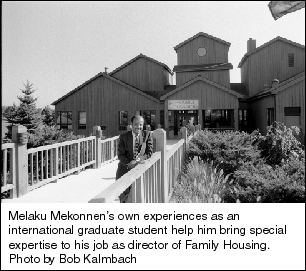The University Record, September 23, 1998
Mekonnen wants to help families ‘mix with the community’
By Jane R. Elgass
 Melaku Mekonnen brings a special blend of life experiences to his job as director of Family Housing that few would be able to match. He has lived the life that many of his residents, particularly international students and their families, are experiencing.
Melaku Mekonnen brings a special blend of life experiences to his job as director of Family Housing that few would be able to match. He has lived the life that many of his residents, particularly international students and their families, are experiencing.
A native of Ethiopia, Mekonnen came to the United States as a graduate student, first at Baylor University, where he earned a master’s in educational administration, and then Texas A&M University, where he earned a Ph.D. in educational administration.
Working with students at Texas Lutheran following graduation from Baylor convinced Mekonnen that he wanted to pursue a career that involved working with students. “I was attracted to the college-age population,” he says, adding that he was able to initiate a number of teaching-learning activities in residential facilities while with the State University of New York (SUNY) system.
Mekonnen’s own background as an international graduate student proved valuable as he worked with international students when he was director of student apartments at SUNY-Stony Brook. Stony Brook also had a number of single parents, and thanks to support programs for them, Mekonnen was gratified to see many of them graduate and move into careers in law and social work. “This was a real achievement for them,” he says.
While at Stony Brook and in conjunction with the Sociology Department there, he initiated a three-credit internship for seniors. The Diversity Peer Educator Program “helped the students understand diversity and prepared them to function effectively in our increasingly global community.”
The majority of the residents in Family Housing are international, bringing not only special challenges to Mekonnen’s job, but also offering opportunities to enrich campus life and that of the surrounding community. And he wants to capitalize on the opportunities.
“I want to help our international families mix with the greater community, become active in school and civic activities,” he says. He sees for the families “wonderful opportunities for cultural exchange activities with school children and senior citizens. This would bring the communities closer together and make connections that would last after graduation.”
He would like to see active participation by Family Housing residents in the local schools, as resources for cultural programs, as members of parent-teacher organizations, as resources for civic organizations.
Mekonnen was attracted to the University because it is a “leading institution with a large international community and some excellent programs,” including Family Housing’s child care center and the English language program.
“But it is more than housing,” he explains, noting that education extends beyond the classroom. “We can offer learning experiences for students as well as their spouses, where they gain skills that may enhance their marketability, or simply provide the experiences that could assist in promoting healthy interactions with other residents.”
Having these kinds of activities available for families of international students “can ease the stress that graduate students may face,” Mekonnen says. “They have a lot to do in a short time with limited funding.”
Mekonnen also says that the U-M offers family services and activities “not readily available on many other campuses. There is strength in the structure here.”
Mekonnen wants to add to those strengths and hopes to cultivate formal ties with several academic units.
He would like to “connect with the faculty in the School of Education and establish a working relationship. The faculty could use our child development program as a model center,” he explains. “Education students could do practicums or internships.”
Mekonnen sees the highly diverse demographics of Family Housing residents as something that might appeal to the Department of Psychology. The English language program, he feels, offers “tremendous opportunities as an extended classroom” for the Department of English.
He also would like to foster partnerships among graduate students living in Family Housing and undergraduates living in the residence halls. “I’d like to see pilot projects in the residence halls,” he says, “in which the students could pair up and support each other, learn from each other. Both could be mentors and peer educators.”
And he wants to tap the resources of the International Center “to create a forum for our students to enrich the cultural experiences of the campus community.”
Mekonnen also has some long-term goals: facilities renovation, program additions and exchange programs.
The Family Housing facilities are 30-40 years old and “need to be improved and renovated to meet the needs of today’s students. Today’s students have different needs than those of the 1960s, such as fast Internet connections,” he says.
Changing demographics of the Family Housing residents will likely drive programmatic changes. “The size and structure of families is changing,” Mekonnen says. There are fewer children. There are more instances in which both spouses are students or one spouse works and the other is a student, creating a need for after-school programs. And there are several teenagers, who require a different sort of after-school program than do elementary school children.
Mekonnen also believes we can learn some things about family housing from colleges and universities in other countries. “I want to explore the possibility of creating institutional links with university housing overseas,” he says, “and create an exchange program for housing staff.”
You can always drop us a line: [email protected].

